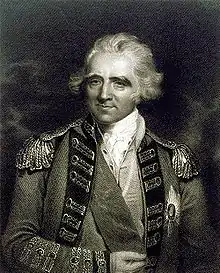William Finden
Life

He served his apprenticeship to James Mitan, but appears to have owed far more to the influence of James Heath, whose works he privately and earnestly studied. His first employment on his own account was engraving illustrations for books, and among the most noteworthy of these early plates were Smirke's illustrations to Don Quixote. His neat style and smooth finish made his pictures very attractive and popular, and although he executed several large plates, his chief work throughout his life was book illustration.[1]
His younger brother, Edward Finden, worked in conjunction with him, and so much demand arose for their productions that ultimately a company of assistants was engaged, and plates were produced in increasing numbers, their quality as works of art declining as their quantity rose. The largest plate executed by William Finden was the portrait of King George IV seated on a sofa, after the painting by Sir Thomas Lawrence. For this work he received two thousand guineas, a sum larger than had ever before been paid for an engraved portrait. Finden's next and happiest works on a large scale were the Highlanders Return and the Village Festival, after Wilkie.[1]
Later in life he undertook, in co-operation with his brother, aided by their numerous staff, the publication as well as the production of various galleries of engravings. The first of these, a series of landscape and portrait illustrations to the life and works of Byron, appeared in 1833 and following years, and was very successful. But by his Gallery of British Art (in fifteen parts, 1838–40), the most costly and best of these ventures, he lost the fruits of all his former success. Finden's last undertaking was an engraving on a large scale of William Hilton's Crucifixion. The plate was bought by the Art Union of London for £1,470.[2] He died in London.[1]
References
- One or more of the preceding sentences incorporates text from a publication now in the public domain: Chisholm, Hugh, ed. (1911). "Finden, William". Encyclopædia Britannica. Vol. 10 (11th ed.). Cambridge University Press. p. 354.
- Encyclopædia Britannica, 1911
External links
- Works by William Finden at Project Gutenberg
- Works by or about William Finden at Internet Archive
- Engraving of
 The Cottage Girl., a painting by Henry Howard in The Amulet annual for 1827 with an attached poem by Felicia Hemans.
The Cottage Girl., a painting by Henry Howard in The Amulet annual for 1827 with an attached poem by Felicia Hemans. - Engraving of
 The Thunder-Storm., a painting by John Wood in the Forget Me Not annual for 1832 with a poetical illustration by Letitia Elizabeth Landon.
The Thunder-Storm., a painting by John Wood in the Forget Me Not annual for 1832 with a poetical illustration by Letitia Elizabeth Landon. - Engravings for Fisher's Drawing Room Scrap Books, with poetical illustrations by Letitia Elizabeth Landon.
- 1832:
 The Palace of Seven Stories., painted by W Turner.
The Palace of Seven Stories., painted by W Turner. - 1832:
 Benares. painted by W Turner.
Benares. painted by W Turner. - 1832:
 The Volcano of Ki-Rau-E-A., painted by William Ellis after Frank Howard.
The Volcano of Ki-Rau-E-A., painted by William Ellis after Frank Howard. - 1833:
 Lancaster. painted by John Henderson.
Lancaster. painted by John Henderson. - 1833:
 Admiral Lord Collingwood. painted by Frank Howard after Henry Howard.
Admiral Lord Collingwood. painted by Frank Howard after Henry Howard. - 1838:
 Rydal Water and Grassmere, from Rydal Park, Westmorland. painted by George Pickering.
Rydal Water and Grassmere, from Rydal Park, Westmorland. painted by George Pickering.
- 1832: